The Best IPv6 VPN in 2025: IPv4 & IPv6 Support
One day in the future, all VPNs will need to support IPv6 or die. For now, our top five IPv6 VPN providers are leading the charge. Discover why you might want an IPv6 VPN, and which one might best fit your needs.
The internet is in the midst of a slow but momentous sea change. As internet protocol version 4 (IPv4) addresses run out, servers are migrating to internet protocol version 6 (IPv6), a new type of address with an arbitrarily large number of possible combinations. If you want to access those servers safely in the future, having an IPv6 VPN will be of paramount importance.
However, with internet service providers (ISPs) able to make do by recycling old addresses, the full IPv6 transition will take some time. Despite the slow transition process, Google’s statistics show that the number of users accessing Google with IPv6 networks has increased to over 46% as of 2024, which means the big switch might just be around the corner.
Most VPNs are still set up for IPv4 addresses only, and using them to connect to IPv6 can pose a security risk. That’s why many VPN services come with IPv6 leak protection, which prevents them from accessing IPv6 addresses altogether.
This isn’t a problem because almost no websites exist solely on an IPv6 address. Since the transition is inevitable, though, we thought we’d compile a list of the best IPv6 VPN services — forward-looking services that have gotten out ahead of the change. Read on for the full list.
-
10/01/2024
We updated the list to reflect the latest advancements in VPN technology and usability.
-
03/17/2025 Facts checked
This article was updated with more details about hide.me’s features and information about IPv6.
The Top IPv6 VPNs
- 1
- : PayPal, Credit card, SEPA, SOFORT, Apple Pay, Google Pay
- : 10
- :
- :
- :
- :
- 2
- : PayPal, Credit card, Discover, Apple Pay, Google Pay
- : Unlimited
- :
- :
- :
- :
- 3
- : PayPal, Credit card, Amazon Pay, Apple Pay, Google Pay, GiroPay, iDeal, SEPA
- : 5
- :
- :
- :
- :
- 4
- : PayPal, Credit card
- : 4
- :
- :
- :
- :
What Makes the Best IPv6 VPN Service?
Most VPN providers implement IPv6 leak protection as a temporary workaround rather than full IPv6 support. This protection works by blocking all IPv6 traffic to prevent it from bypassing the VPN tunnel, which would otherwise expose your real IP address and defeat the purpose of using a VPN.
While effective for now, this approach will become increasingly problematic as more websites adopt IPv6-only infrastructure. Robust IPv6 leak protection is still essential for any top-tier VPN, though, as it prevents your real IPv6 address from being exposed even if your VPN connection drops momentarily, maintaining your privacy at all times.
To make our best IPv6 VPN list, a VPN provider must either currently have, or be about to launch, full IPv6 support — not just IPv6 leak protection. Otherwise, the criteria are very similar to those for our overall best VPN list.
We looked for the same things we usually seek in VPN services: strong security, great speeds, a verified no-logs policy, the ability to access streaming services and a user-friendly interface. A service on any of our best VPN lists should also have a broad server network, useful features (a kill switch and split tunneling at minimum) and support for plenty of platforms.
IPv6 split tunneling capabilities allow you to route some applications through the VPN’s IPv6 tunnel while others access the internet directly, providing flexibility without compromising security.
Some advanced VPN services offer static IPv6 addresses, which can be beneficial for activities requiring consistent identification while still maintaining privacy through the VPN’s encryption. A quality IPv6 VPN must prevent WebRTC leaks as well, which can expose your real IPv6 address through your browser’s WebRTC features even when connected to a VPN.
Support for modern VPN protocols like WireGuard is especially important for IPv6 users seeking optimal performance, as WireGuard’s lightweight design provides faster speeds while maintaining excellent security standards.
When considering an IPv6 VPN, check for router compatibility to extend IPv6 protection across all connected devices in your home network with a single installation.
Our search for the best VPNs for IPv6 was trickier than usual, because many of the top VPNs overall want nothing to do with IPv6. NordVPN, ExpressVPN, Private Internet Access and Proton VPN block all IPv6 traffic. Surfshark and VyprVPN have no IPv6 infrastructure whatsoever. Even Windscribe, the great iconoclast, throws up firewalls to all IPv6 internet traffic.
We had to dig deep to find most of the IPv6 VPN services on this list. A provider has to be a little eccentric to devote resources to IPv6 while IPv4 still has at least 15 years before obsolescence. That said, if you care about IPv6 — and everyone will, sooner or later — these four VPNs deserve your attention.
The 4 Best IPv6 VPN Providers
Each VPN on this list has made an active choice to prioritize IPv6 support. Instead of blocking or redirecting IPv6 traffic, these VPNs have the resources to engage with it like any other address.
1. hide.me — The Best IPv6 VPN
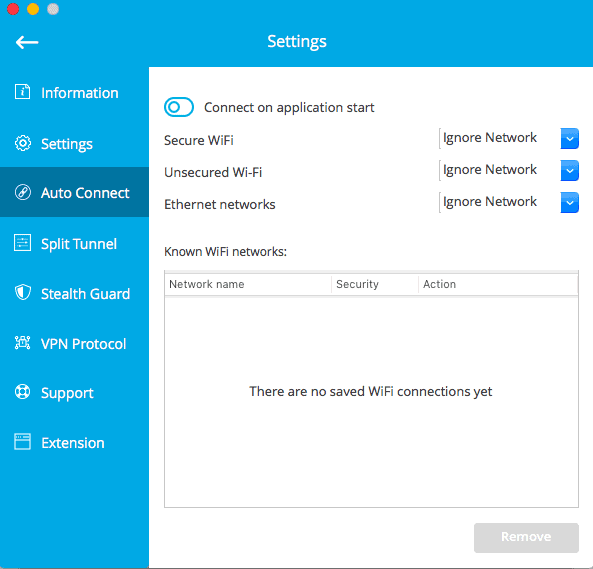
hide.me is the best VPN that currently has full support for IPv6. It uses a “dual-stack solution” that processes both IPv4 and IPv6 addresses, so there’s no danger of traffic from either internet protocol passing outside of the encrypted tunnel.
As the website points out, IPv6 traffic is also faster because its systems are far less congested. However, don’t forget that very few web servers currently have IPv6 addresses without IPv4.
hide.me has improved its IPv6 implementation by adding a new setting that lets users set their preferred IP protocol (IPv4 or IPv6) for establishing VPN tunnels. This gives users more control over how they connect to IPv6 resources and can help optimize performance based on their network configuration.
The VPN service has expanded its user feedback channels with a dedicated social media section and tools for reporting broken websites, requesting streaming locations and submitting bug reports. This improved feedback loop helps ensure its IPv6 implementation remains stable and compatible with evolving web services.
In late 2024, hide.me introduced a completely redesigned interface featuring a customizable widget dashboard and an interactive map view of server locations. This modern interface makes it easier to monitor both IPv4 and IPv6 connections while providing quick access to frequently used features.
For additional security, hide.me now allows users to lock the VPN application with a PIN code, preventing unauthorized changes to VPN settings or connections. This is particularly valuable for shared devices where maintaining the integrity of IPv6 leak protection settings is critical.
The convenient “pause VPN” feature, accessible from the system tray, allows users to temporarily disable their VPN connection without fully disconnecting. When paused, the application maintains its IPv6 leak prevention settings to ensure no unprotected traffic is exposed.
Outside the realm of IPv6, hide.me is a growing VPN with great features and a lot of potential. We’re particularly fond of its auto-connect — which rivals CyberGhost’s “smart rules” for depth — and Stealth Guard, a strong kill switch that prevents you from connecting to the internet if your VPN isn’t running.
hide.me has also introduced SmartGuard, a comprehensive DNS filtering system that blocks ads, malware and potentially harmful websites. This feature works seamlessly with its IPv6 implementation, providing an additional layer of security without compromising the benefits of IPv6 connectivity.
In addition, hide.me offers dynamic port forwarding, which is particularly beneficial for users who need to access services behind their VPN connection. This feature allows specific applications to establish direct connections through the VPN, improving performance for P2P file sharing, hosting game servers or remote access applications while maintaining privacy.
Users can limit port forwarding to specific applications, providing more granular control over which programs can establish direct connections through the VPN. This enhances both security and performance for IPv6 connections that require port forwarding functionality.
A Free Plan With Weight
hide.me’s best offering, though, is its free plan, which landed it a spot on our best free VPNs list. It has some limitations — you can use only one device at a time, access VPN servers in eight countries and use 10GB of data per month. However, free users do get nearly all of hide.me’s features, including IPv6 support.
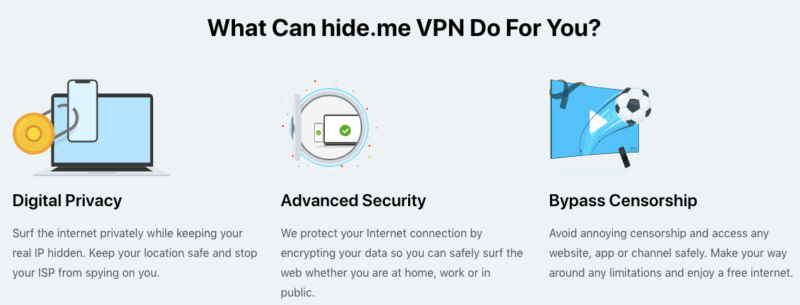
If you decide to spring for a paid plan, hide.me is one of the better-priced VPNs overall. One month costs just $9.95, a relatively good price for those not ready to commit.
On the other hand, the one-year subscription is a bit pricey: $54.95; Surfshark, Private Internet Access and CyberGhost handily beat the deal. Our comprehensive hide.me review has more details on all its features, pricing and more.
- 5 servers
- 10GB
- 1
- Unlimited GB
- 10
- Yes
2. Perfect Privacy — IPv6 VPN With Strong Security Features
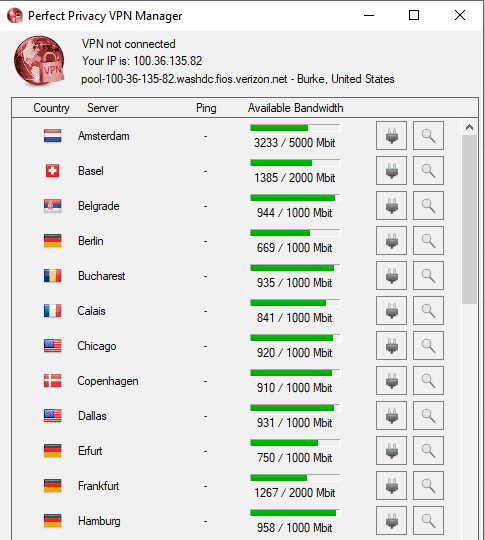
To be honest, Perfect Privacy isn’t one of our favorite VPNs, as you can read all about in our Perfect Privacy review. It’s great at privacy, storing all user activity on RAM servers that wipe themselves about once an hour — but if you use a VPN primarily for streaming, you’re out of luck. In our tests, Perfect Privacy failed to unblock any major platforms.
That said, IPv6 support is one area in which Perfect Privacy outstrips the competition. As with hide.me, all its VPN servers provide both an IPv4 and IPv6 address, preventing leaks and letting you enjoy stability and relative speed.
Configurable Kill Switch
Perfect Privacy has a few strong features other than IPv6 support. Chief among them is a kill switch that disables your internet connection if you’re not connected to a VPN server. This kill switch comes with three settings that determine how vigilant you want the kill switch to be. At the highest level, you won’t be able to access the internet at all without your VPN running.
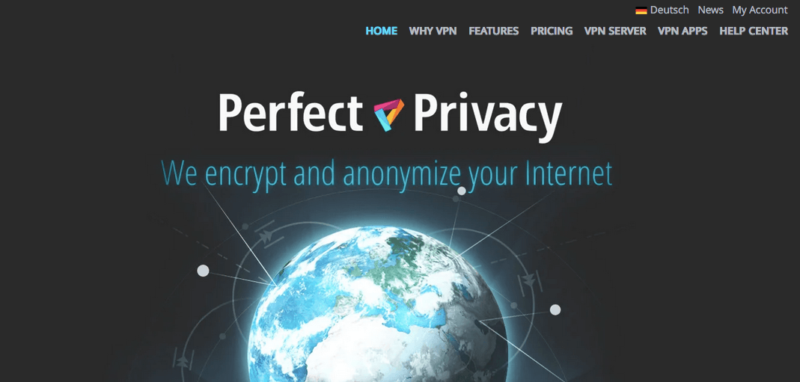
Although it looks and behaves like a discount VPN service, Perfect Privacy is anything but. It charges as much for one month as NordVPN, and the one- and two-year plans hardly lower the price. You can also only request a refund for seven days after purchase — so make sure IPv6 support is something you really care about.
3. AirVPN — Highly Customizable IPv6 VPN

AirVPN is an expert-level VPN. While other services are racing to build the most streamlined apps, AirVPN swims against the current, focusing on packing in a truly enormous number of features. Users have the power to configure every aspect of their OpenVPN and WireGuard connections — but it may be difficult without in-depth technical knowledge.
One thing AirVPN makes clear, though, is that it supports both IPv4 and IPv6, with every server having four of each type of address. As you can read in our AirVPN review, it even defaults to IPv6 in many cases, which can be a problem if your computer isn’t set to accept IPv6 traffic. Every server also has its own custom DNS, securing it against potential leaks.
Highly Customizable VPN
Every feature of AirVPN is built to give you the most freedom possible, but it refuses to hold your hand. The execution of its split-tunneling feature is a great example.
You can manually bind apps to IP addresses in the AirVPN network, so they can’t work unless the VPN is active. Unbound apps will go through your internet service provider as normal. It’s a kill switch and split tunneling combined into one.
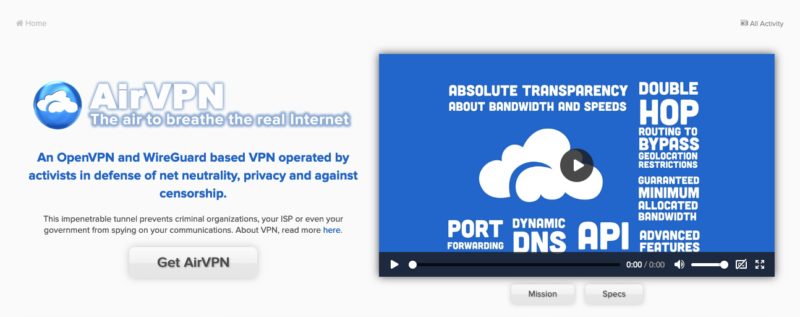
AirVPN might be the app for you.
AirVPN isn’t for everybody, but it does boast one more feature not every VPN offers: an active and lively user forum with thousands of posts discussing every aspect of the system. If this tinkerers’ VPN appeals to you, you can have it for relatively cheap. Be warned that pricing on the website is in euros, so the table below may become outdated as currencies fluctuate.
- Unlimited GB
- 5
- Yes
- Unlimited GB
- 5
- Yes
- Unlimited GB
- 5
- Yes
More plans
- Unlimited GB
- 5
- Yes
- Unlimited GB
- 5
- Yes
- Unlimited GB
- 5
- Yes
- Unlimited GB
- 5
4. OVPN — Fast VPN With IPv6 Support
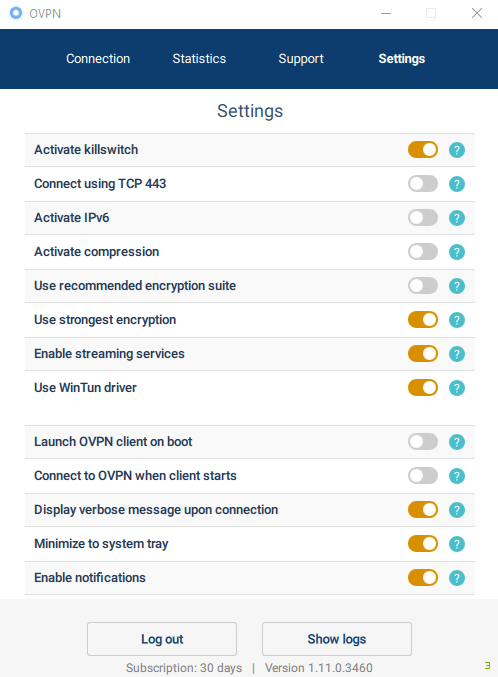
OVPN supports both IPv4 and IPv6 on every VPN server by default. If your operating system doesn’t support IPv6, you’ll need to shut it off with the IPv6 override feature.
OVPN stands out, thanks to its attempts to squeeze every last bit of speed and performance out of its VPN network. It owns its entire network, eschewing rentals and virtual servers, so it can tinker with the software and hardware and shave those extra few milliseconds off its latencies. It goes as far as installing special drivers that work better with WireGuard.
This effort doesn’t always filter down to the end user, though. OVPN’s obsessive focus means its VPN server network is rather limited. Only four of its 32 servers are located outside the U.S. and Europe (one each in Canada, Japan, Singapore and Australia). It also doesn’t always deliver the fastest speeds over a long distance.
Choose the Best Encryption
Most VPNs use AES-256 encryption across all protocols, for good reason — it’s uncrackable with current technology. However, it may not always be the fastest cipher, so OVPN adds the option to switch to ChaCha20-Poly1305. We ran speed tests for our OVPN review and found that ChaCha20 often does lower latencies and increase download speeds.
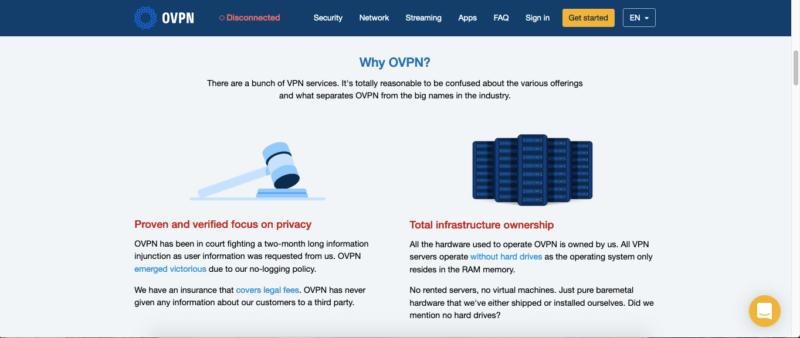
its no-logs policy, but it certainly helps.
Additionally, OVPN’s strict no-logs policy has been tested in court and came out on top. It bolsters its privacy credentials with monthly transparency reports. Unfortunately, its pricing is less friendly, with even its long-term deals eclipsed by more robust competitors. Note that higher pricing tiers come with more simultaneous connections.
Honorable Mentions
Some other VPNs are on our radar for IPv6 compatibility, but we’re not ready to fully recommend them just yet.
CyberGhost
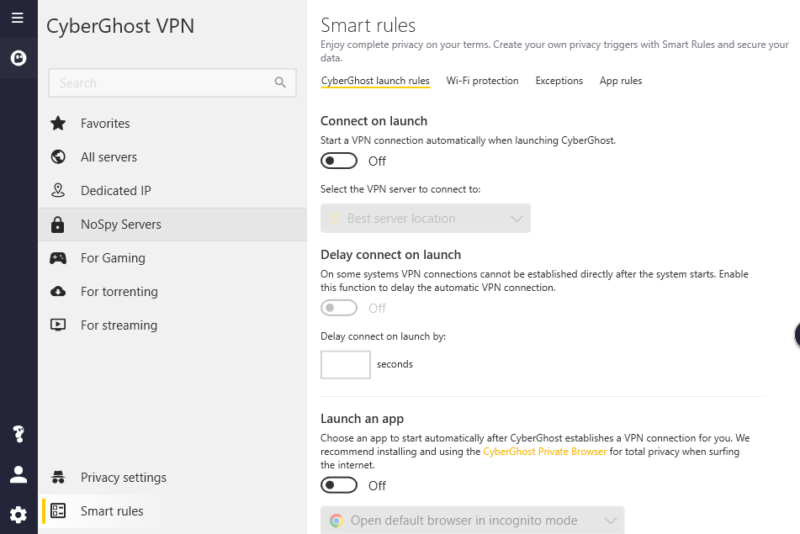
While compiling this list, we followed up on reports that CyberGhost was preparing to support IPv6 traffic. Allegedly, CyberGhost has already started implementing IPv6 on servers in its home country of Romania, with full support on all servers expected “very soon.”
Unfortunately, the blog post announcing these updates seems to have disappeared, making it impossible to verify the reports at this time. Because of this, CyberGhost must remain an honorable mention for now.
All we’ve got are rumors, but if true, CyberGhost would be the best VPN so far to enact full support for IPv6 (no shade to hide.me, but CyberGhost is simply a better product). It’s got a crisp user interface, servers in 91 countries and the ability to unblock every streaming service except Amazon Prime Video. Learn more about all this in our CyberGhost review.
AzireVPN
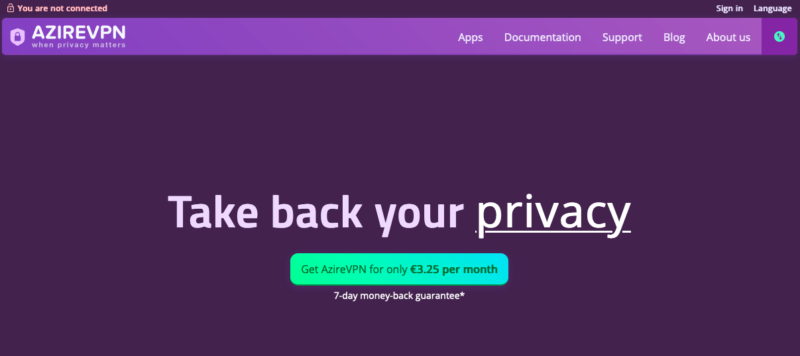
limited server network and lack of features.
Like OVPN, AzireVPN is a Sweden-based VPN service with built-in support for IPv6. It also shares OVPN’s weakness of a limited server network, though AzireVPN’s is even smaller, reaching only 21 countries. These servers do perform well in speed tests, though.
The bigger problem is that AzireVPN is devoid of the basic features we expect of VPN services. You won’t find a kill switch (except on Android), split tunneling or multi-hop connections here. Without a kill switch or split tunneling, we can’t recommend AzireVPN for torrenting or any other risky activities — but with a little more growth, it may yet get our recommendation.
What’s the Difference Between IPv6 and IPv4?
The short answer: not much, at least for most of us. The long answer is in our full IPv4 vs IPv6 rundown, but we’ll share a medium answer in this section.
To be part of the public internet, web servers need unique IP addresses. Since no two connected servers can have the same address, the number of available IP addresses limits how big the World Wide Web can be. IPv4 was the first internet protocol version deployed on the modern web, and it allows for about 4.3 billion addresses.
That was more than enough when the internet was in its infancy, but the humble network exploded in the ʼ90s. In February 2011, all of IPv4’s addresses were allocated for the first time; by 2019, they’d all been used at least once.
This milestone could have spelled the end of the internet, but web developers saw it coming far in advance. They built technologies that stretched the pool of available IPv4 addresses, including network address translation (NAT).
NAT is a crucial technology that has extended IPv4’s lifespan by allowing multiple devices on a local network to share a single public IP address, effectively conserving the limited IPv4 address pool.
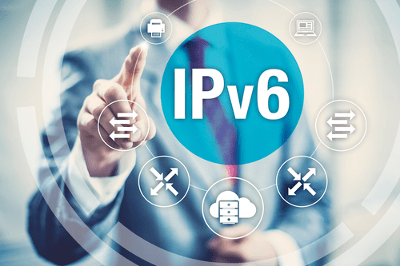
ISPs can extend the lifespan of IPv4 by recycling old, unused addresses, but ultimately, all these technologies are just temporary fixes. The only long-term solution to IP address depletion is full migration to the new internet protocol, IPv6 (there’s no such thing as IPv5).
While IPv4 offers approximately 4.3 billion addresses, IPv6’s 128-bit addressing scheme provides an almost unfathomable 340 trillion trillion trillion unique addresses, effectively solving the address exhaustion problem for the foreseeable future.
IPv6 employs a simplified header format compared to IPv4, which streamlines packet processing and routing decisions, contributing to potentially faster connection speeds and more efficient data transmission across networks.
Beyond just address space and speed, IPv6 introduces important security enhancements like router advertisement (RA) guard and Secure Neighbor Discovery (SEND), which protect against rogue neighbor discovery and unauthorized router advertisements, significantly improving routing security compared to IPv4.
Another significant improvement in IPv6 is its support for end-to-end connection integrity, which ensures that data packets arrive at their destination without unauthorized modification, a security feature that IPv4 lacks entirely.
In addition, IPv6 includes built-in support for IPsec (Internet Protocol Security), enhancing the protocol’s security foundations with authentication and encryption features that were only optional add-ons in IPv4.
Will IPv6 Change Anything?
IPv6 has been available since 1998, but adoption has been slow so far. IPv6 requires costly upgrades to both hardware and software, and ISPs have been loath to spend the time and money — just like most VPN providers. As the IPv4 shortage begins to squeeze growth, however, we’ll likely see both ISPs and VPNs step up migration efforts.
What does this all mean for the user? Ideally, not much. From the user’s perspective, IPv4 and IPv6 support the same internet. You’ll notice only if the tools you use to get online — your operating systems, browser and VPN — don’t have the settings or infrastructure to manage the switch.
At that point, you’ll need to look for IPv6-capable alternatives, like the VPNs on this list. The dual-stack solution allows VPNs to process both IPv4 and IPv6 traffic simultaneously, ensuring all your internet activity remains encrypted regardless of which protocol your network uses or the websites you visit employ.
Some mobile carriers like T-Mobile in the U.S. have already implemented IPv6-only networks, making VPN compatibility with IPv6 increasingly important for mobile users on these networks.
Final Thoughts: IPv6 VPN Options
The time when new websites run solely on IPv6 is a long way off. As it gets closer, though, we’re likely to see more top-tier VPNs follow hide.me’s lead and install full IPv6 support.
While disabling IPv6 in your system settings is a short-term workaround with some VPNs, this solution becomes less viable as IPv6 adoption increases, making VPNs with native IPv6 support the more future-proof choice. This list will change when that happens, but for now, the four VPNs listed are our favorite choices for IPv6 sites.
CyberGhost would be in the lead, but it hasn’t fully implemented IPv6 yet. If you need your IPv6 VPN to be battle-ready today, hide.me is your best choice. Before committing to any VPN for IPv6 usage, it’s advisable to run an IPv6 leak test to ensure the service is properly securing all your traffic and not exposing your real IPv6 address.
How are you preparing for the IPv6 migration? Do you have a favorite VPN for IPv6 we didn’t mention? We’d love to hear your voices in the comments. Thanks for reading!
FAQ
Only a few VPNs work on IPv6 at the moment, including hide.me, AirVPN, OVPN and Perfect Privacy. Most of the others block IPv6 traffic altogether, since it can pose a security risk when not properly supported.
We recommend keeping IPv6 enabled, but testing regularly for IP leaks. If you find one, or if your VPN connection seems unstable on certain sites, you can troubleshoot by disabling IPv6.
If your VPN has IPv6 support, you should keep it enabled, unless it’s causing leaks or connectivity problems. Be aware that most VPNs block IPv6 traffic by default.





